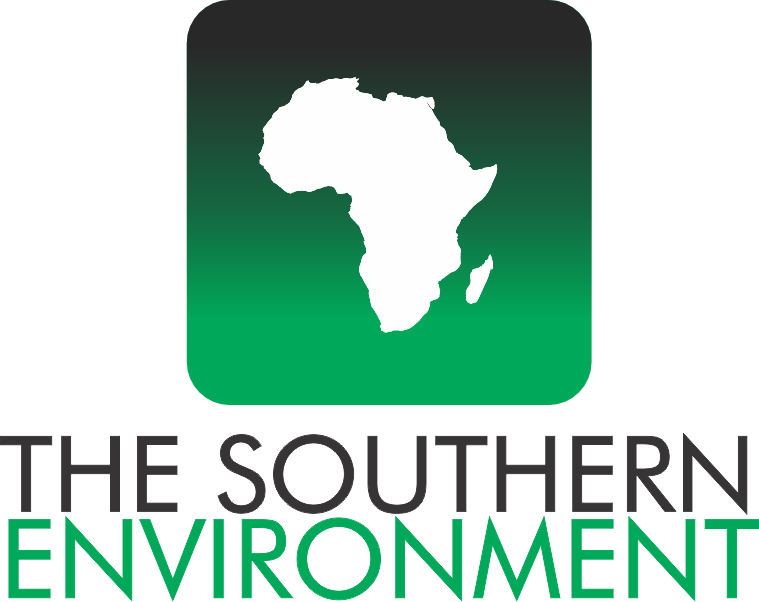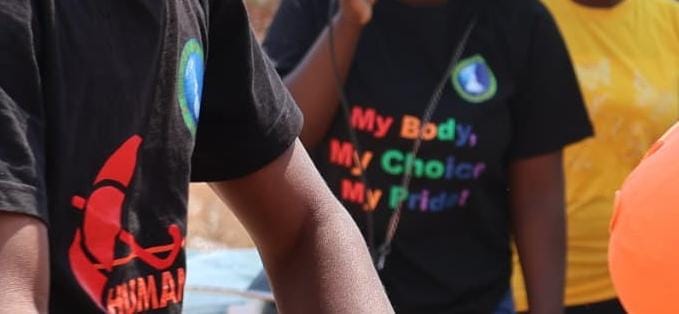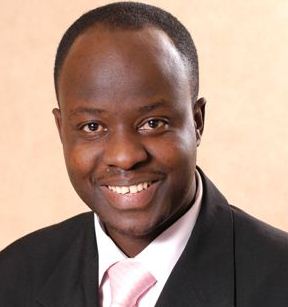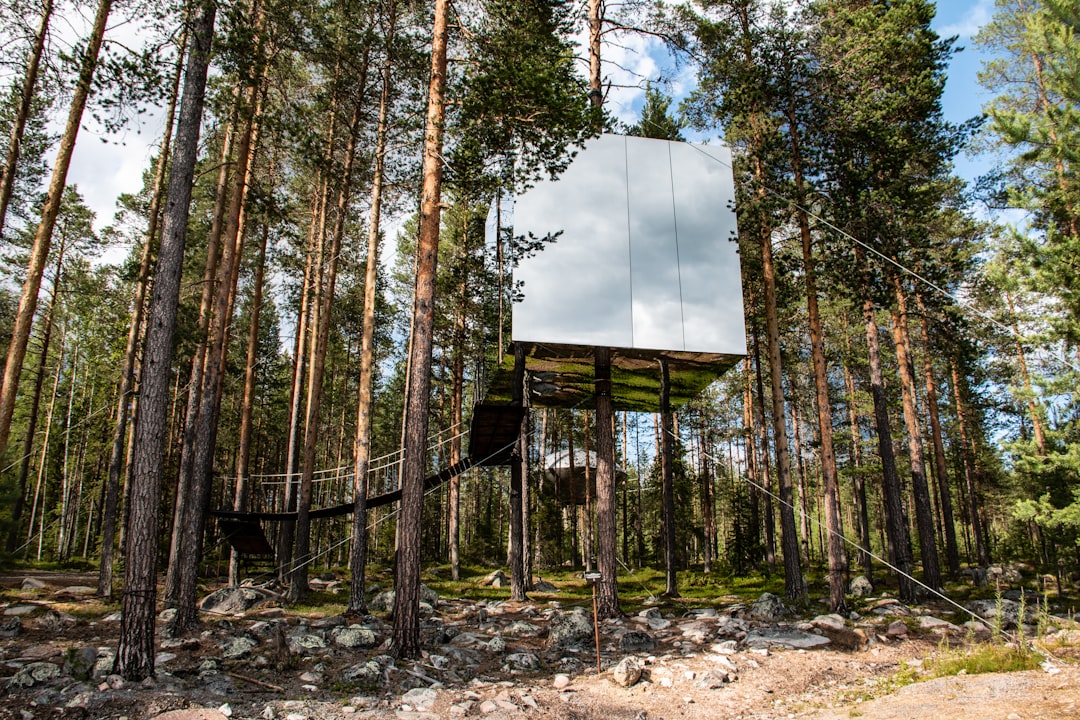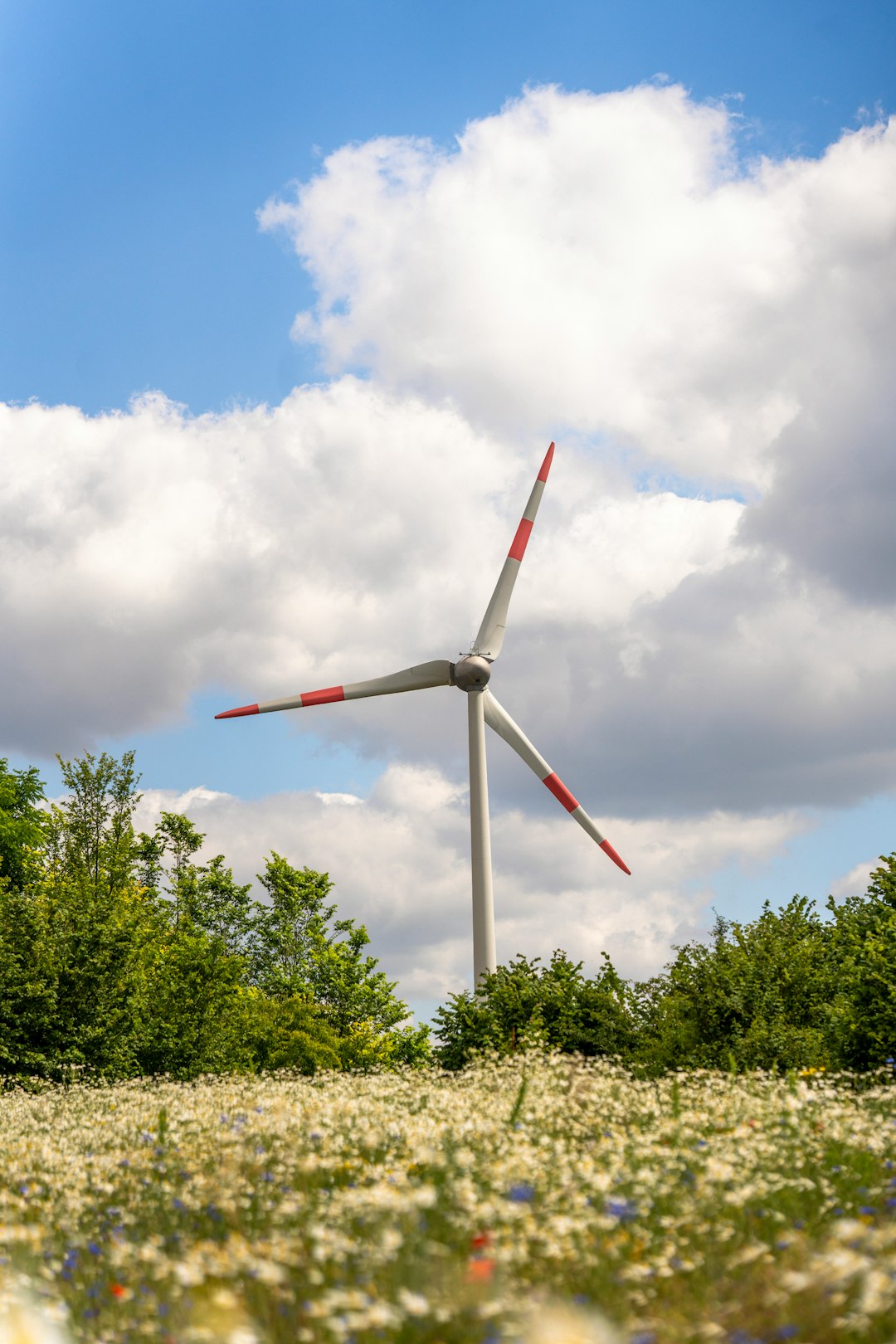Across Zimbabwe’s parched fields and flooded lowlands, two competing explanations for calamity are spreading.
Scientists point to El Niño, changing rainfall patterns, deforestation and weak water management. But an increasingly loud counter-narrative — repeated at pulpits, in private Facebook groups, on X/Twitter and on TikTok — insists that droughts, floods and cyclones are moral punishments from God for societies that tolerate “sin,” and pins the blame squarely on members of the LGBTQI community.
There is a growing pattern on social media platforms and public pages of Zimbabweans amplifying a moralized explanation for climate harm that scapegoats an already-marginalized community.
That narrative distracts from the science behind climate risk, worsens discrimination, and makes it harder for the public to support evidence-based climate policy and inclusive adaptation measures.
Blaming minority groups for disasters is an ancient trope. Earthquakes, plagues and famines have often been reframed as divine retribution in many societies. Today in Zimbabwe, variants of that trope are taking this form: “Our drought/floods/cyclones are punishment for accepting LGBTQI people.”
X user, @_wasu23, for example, in a post made on July 9, linked homosexuality to the biblical context of the Sodom and Gomorrah case, where people, traditionally associated with homosexuality, were punished and the city had a fire rain because of their transgressions. “People will hate heterosexual marriages, because of that, then what’s next, you start to see homosexual marriages flourishing, and our young boys and girls will like that, ngochani dzowanda munyika, kuhura munyika hakuchaperi (gay and lesbian people have become so many in this country), very soon we will be like Sodom and Gomorah,” they wrote.
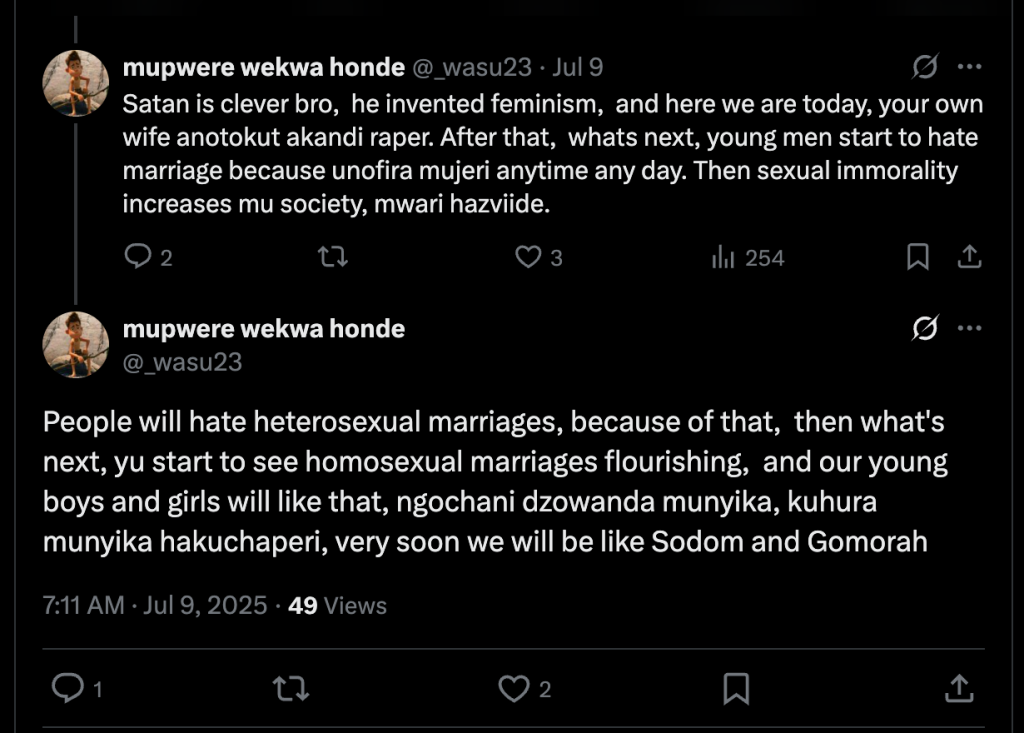
Screenshot of the tweet by @_wasu23.
In an interview with The Southern Environment, a transgender representative, Queen Chihera, says, “I always hear rumours say it is because of this community that there is no rain, but I want to take you back where people used to blame and have so many environmental myths on albinos and twins. That is the same thing that is happening to us now. I am worried when people take judgment from God to be theirs. They say gays and lesbians cause environmental disasters, but we cannot control nature. We are here as the variety of the creation of God and climate change is sometimes a natural disaster and sometimes man-made, not what the myth being spread out by people.”
Commenting on this interview, Rowan Madzamba, a Zimbabwean gospel musician based in South Africa, defended the myths. “It is also important to take along our cultural and societal values of our communities as we make scientific decisions. Science must be to amplify not to destroy what we believe in….. so it is not only stereotyping but also what we believe in,” he wrote.
International outlets reporting about queer Zimbabweans show the community is simultaneously organizing climate-resilience projects and being accused in the same breath of “causing” the drought — an indication that hostile narratives are targeting minority groups in spite of the facts. Local activists say the trope has taken hold in Zimbabwe over the last five years and resurged alongside major climate events, especially the El Niño-linked droughts and the increasingly severe rainy seasons.
Origins and mechanics: Who starts it? Who amplifies it?
A review of public statements and social media activity shows different recurring types of amplifiers for this narrative. First are the preachers, commonly referred to as men of the cloth, who have massive audiences on Facebook and YouTube.
Historical records and advocacy groups show some prominent preachers have a longstanding record of anti-LGBTQ remarks. Church messaging that frames national misfortune as a moral failing is an easily repurposed vector for blaming LGBTQI people, as followers comment that gayism is a taboo, causing environmental disasters. Pastor Mduduzi Shembe, leader of the Ebuhleni division of the Shembe church, made such comments at a function in Nongoma in KwaZulu-Natal. Instead of pointing fingers at El Niño, wasteful water usage or leaking infrastructure, he railed against those who defied God, claiming that they had led to his vengeful response against South Africa.
Speaking in Zulu, Shembe allegedly said: “Men are now marrying men, and this is why we are currently facing this curse of hot sun and drought.”
Another pastor, Vincent Wienand from Revelation Ministries, proclaimed in 2015 that Cape Town was “the gay city – the burning lake of fire!” He was suggesting that the fires that devastated Cape Town were a result of homosexuality. The pastor’s followers commented on the post in their numbers, lashing the LGBTQI community.

Screenshot of the Facebook post by Pastor Vincent Wienand
We also have social media influencers and TikTok users amplifying the narrative about the LGBTQ community. On platforms where verification is weak, posts proclaiming that disasters are divine punishment are shared rapidly across closed and public groups. My searches turned up repeated posts and threads on TikTok where disaster coverage is tied to moral claims about sexuality; identical or near-identical phrases reappear across separate posts in short order, suggesting coordinated copy-and-paste amplification rather than isolated invention.
Public group posts and screenshots in Shona, a local language, saying, ‘Manhanga haambokora pakadai (We will never have a bumper harvest in Zimbabwe with this happening).’

Screenshot showing the ‘Manhanga haafe akakora pakadai’ comment on TikTok.
Another screenshot, below, shows a user commenting using vulgar language in vernacular but also mentioning that ‘murikutadzisa mvura kunaya,’ translated to ‘you are causing a lack of rainfall’ in response to a video of a gay person announcing that his boyfriend was ready to pay bride price for him.
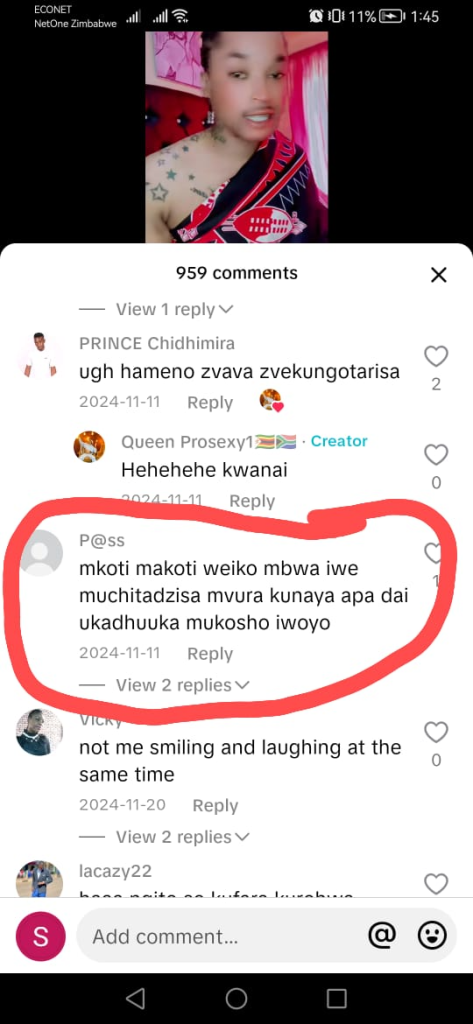
In an X post from October 2024, a user commented on a post that reported that scores of people were arrested from a pro-LGBTQ WhatsApp group. “We confirm that we have picked up two suspects who have assisted us to unearth a gay and homosexual WhatsApp group with more than 1000 participants who have been meeting at various places and houses in Harare. Investigations are still in progress,” the original post said.
User, Kaycee (@kudzanaichacha1) commented, “Mapurisa kombai comment section yese yakazara vanhu ivavo, vakutadzisa mvura kunaya,” translating to “Police should arrest everyone of them, they are many on social media. They are the ones causing low rainfall in our country.”
Another X User Deni Z Chitsinde (@chitsinde_z) also commented on the post, sharing the same sentiments, “Ngavasungwe, ndo varikuita kuti mvura isanaye.. Ngavaende Ku Jere,” translating to “Arrest them, they are causing droughts and low rains, they deserve jail.”
Identical claims — “God is punishing us because of the gay agenda” or variants — appear on multiple TikTok posts and in public X/Twitter threads within hours whenever members of the LGBTQ community post videos of themselves.
Impact: Policy, public discourse and everyday danger
The harms of this narrative are multi-layered.
First, we have policy distraction. When disasters are reframed as moral failings, calls for reforestation, water management, resilient agriculture, early-warning systems and investment in boreholes lose urgency in public debate. Reporting on Zimbabwe’s drought and animal die-offs underscores that climate drivers (El Niño, warming, land-use change) are the proximate cause — not morality. Yet moral scapegoating undermines policy support for technical, evidence-based solutions.
Another harm is the heightened risk to LGBTQI people. Scapegoating increases stigmatization and can precipitate harassment, eviction and denial of aid. Rights groups have documented cases where religious or community leaders’ rhetoric has been followed by localized exclusion or violence against queer people — especially during humanitarian crises when aid distribution is controlled locally. Advocacy organizations and community groups have repeatedly warned of these dangers.
Additionally, there is the erosion of climate literacy. Framing climate events as moral signals discourages scientific literacy and civic engagement. It makes communities less likely to accept adaptive practices (e.g., crop diversification, water harvesting) because they are treated as irrelevant to “God’s will.”
My social-media probes show clear thematic replication across platforms and sources; the language used in public posts and group threads is often identical or lightly edited.
Public evidence nonetheless supports a credible chain; social media actors replicate those frames rapidly, and then the narrative migrates into private groups and local spaces.
Zimbabwe faces real, life-threatening climate hazards. Turning complex environmental collapse into a morality play with LGBTQI people as scapegoats is both scientifically false and socially dangerous. The evidence shows a pattern — not a singular culprit: a mix of historical homophobia, political opportunism, and social-media dynamics is driving the scapegoating. Documenting and exposing the pattern, protecting vulnerable communities, and refocusing public debate on concrete climate solutions must be urgent priorities for journalists, civil society and policymakers.
This article was produced with mentorship from the African Academy for Open Source Investigations (AAOSI) as part of an initiative by the Ministry of Foreign Affairs of Norway and Code for Africa (CfA). Visit https://disinfo.africa for more information.
